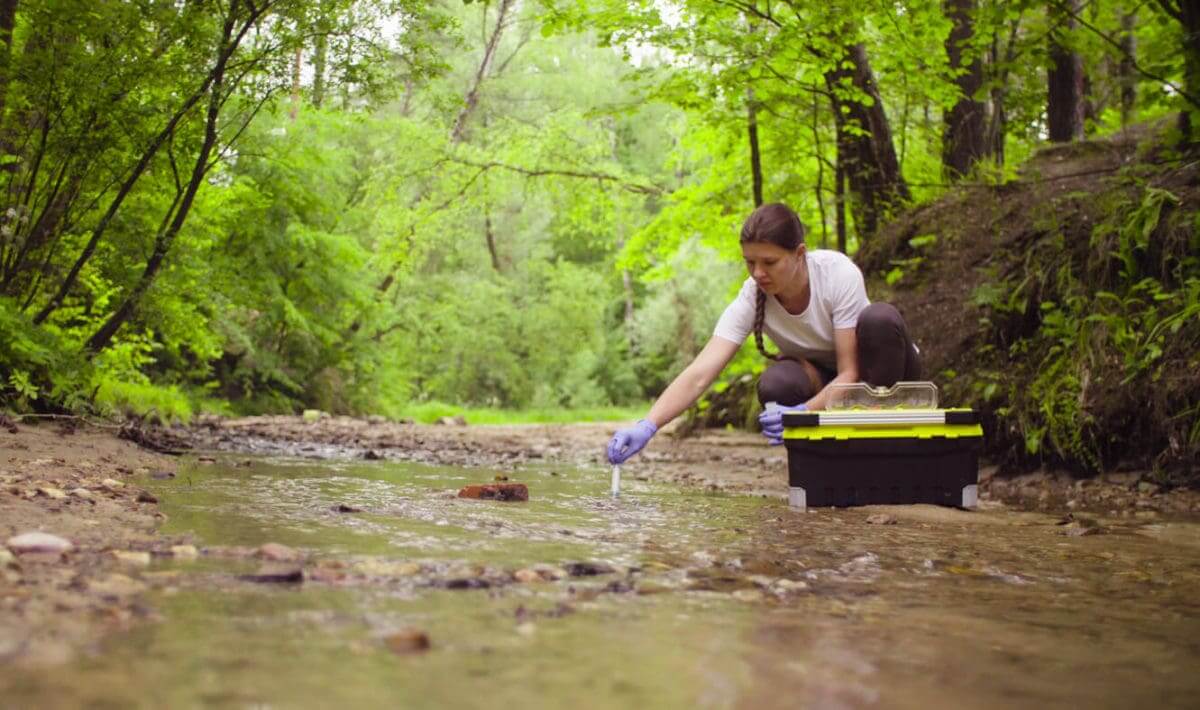

Have you always looked around the natural world with a sense of wonder or had a desire to further examine habitats up close? If so, you may be interested in learning how to become an ecologist and spend your work days studying plants, animals, and ecosystems.

With habitats increasingly at risk due to climate change, the field of ecology is more important than ever to study and help preserve the natural world. This guide covers the most important ecologist skills and education requirements needed for a successful, fulfilling career. It also answers common questions such as what does an ecologist do and what does an ecologist study.
|
Career Path Overview for Ecologist |
|
|
Education Requirements |
Bachelor’s Degree |
|
Recommended Degree Program |
|
|
Average Salary (2021) |
$76,530 |
|
Workers Employed in U.S. (2021) |
80,000 |
|
Projected Job Openings |
3,800 |
|
Projected Growth Rate |
5% (As fast as average) |
|
Other Job Titles |
Environmental Scientist, Conservationist, Biologist |
|
Related Careers |
|
Source: Bureau of Labor Statistics
What Do Ecologists Do?
Ecologists use multi-disciplinary skills and knowledge in the biological, physical, and social sciences to solve environmental problems and protect species and ecosystems. Ecologists study the relationships between different flora, fauna, and their surrounding environments in order to understand and predict future environmental conditions and ensure the vitality of the natural world.
An ecologist job description often includes using technology and special instruments in labs and in the field to assist in collecting and analyzing data. They help to design, manage, and evaluate projects that promote conservation and sustainability. Example projects include restoring native habitats, improving water quality, and building new infrastructure. Ecologist jobs are essential to mitigating the negative effects of climate change.
Types of Ecologists
The day-to-day responsibilities of an ecologist vary based on their specialization. Choosing a specialty area allows you to really hone in on your strengths and passions. Here are some common types of ecology:
- Population Ecology: Focuses on changes in the population size and density of specific species
- Landscape Ecology: Focuses on the distribution and movement of species across geographical areas
- Community Ecology: Focuses on ecosystems and the interactions between different species in a certain area
- Molecular Ecology: Focuses on the study of organisms at the molecular level
- Conservation Ecology: Focuses on preserving species and natural resources and promoting biodiversity
Where Do Ecologists Work?
The top employers for ecology jobs are government agencies and management, scientific, and technical consulting services. Within government agencies, the majority of ecologists work at the state government level. Other ecologists work for non-profit conservation organizations. Most ecologists work full-time in laboratories, offices, and out in the field.
In the Office
Ecologists do a lot of their work in offices and laboratories conducting data analysis, writing reports, and communicating with various stakeholders. An ecologist job often involves collaborating with other scientists, government officials, and organizations to complete projects. Other ecologists focus on educating the public about the environment. This work may require some travel to different locations.
If you are interested in working in veterinary offices, you may like a career as an animal care specialist instead.
In the Field
A field ecologist spends most of their time out in various environments, making observations and collecting samples for specific projects. They may not work only in the field but spend a good amount of time there. Field ecologists may have to walk long distances or traverse difficult terrain to reach remote locations. The work may be physically demanding and require safety precautions and protective gear.

Average Ecologist Salary
While the Bureau of Labor Statistics (BLS) does not have specific salary data for ecologists, ecology jobs are included in the broader data on environmental scientists and specialists. The median salary for environmental scientists and specialists in 2021 was $76,530. The top 10% of workers made $129,070 on average.
States with the highest average salaries for environmental scientists:
- District of Columbia
- New Jersey
- Massachusetts
- California
Looking for high-paying jobs working with animals? A degree from Unity Environmental University can put you on the right path to a rewarding career.
What is the Job Outlook for Ecologists?
Based on BLS data, the job outlook for environmental scientists, including ecologists, is average compared to all other occupations. Experts expect a 5% increase in job openings for ecology careers in the next ten years. As the effects of climate change continue, the need for ecologists will remain high, which could lead to more funding available to solve environmental problems and even more job openings.
- Estimate of jobs available in 2021: 80,000
- Rate of projected job growth: 5% (as fast as average)
- New jobs to be added in the next 10 years: 3,800
- Fastest growing states for jobs: California, Florida, Illinois, and Georgia
Ecologist Education Recommendations
Most careers in ecology require a bachelor’s degree in environmental science or a related field. This typically takes four years after high school. Some positions may require a master’s degree as well, particularly leadership and research positions.
Ecology requires strong foundations in math, science, and critical thinking skills. Students preparing for an ecologist career should work on honing these skills:
- Problem solving and analytical skills
- Written and verbal communication skills
- Collaboration skills
- Internal motivation
Ecologist High School Recommendations
High school students can begin preparing to become an ecologist by taking advanced science and math courses including biology and statistics. Some high schools even offer an environmental studies elective. Students can also join related extracurriculars such as a beach clean-up or animal rights club. Aspiring ecologists can start to gain practical experience through volunteer opportunities and internships. Check your local zoo and other non-profit organizations for opportunities for students.
Are you a high school student just beginning to explore career options? Learn more about jobs to help save the planet from Unity’s blog.
Ecologist College Education Recommendations
Ecologist education requirements vary depending on the specific position and employer, but generally, a bachelor’s degree is required. The degree program you choose should include courses in biology, chemistry, geology, and other natural sciences. It should include classroom instruction and lab experience. If you are interested in careers in ecology and conservation, consider a degree in wildlife conservation.
Undergraduate
Undergraduate students work towards earning a bachelor’s degree such as a BS in environmental science. Unity Environmental University offers several different types of undergraduate ecology courses that can be taken as the core requirements for a degree program or as electives. Online ecology courses include:
- Biological Diversity, Ecology, and Evolution
- Coral Ecology and Conservation
- Wildlife Ecology and Management
Postgraduate
To advance to something like a natural resource manager or other senior-level position as an ecologist, a master’s degree is often required. This usually takes two years to complete after a student earns their bachelor’s degree. Get a taste of graduate-level coursework with Unity Environmental University’s 8-week online conservation ecology class.
Additional Certifications and Licenses
The Ecology Society of America offers five levels of ecology certification depending on education level and years of relevant work experience. While one of these certifications may give you a leg up when applying for jobs, most ecology positions don’t require any extra certifications or licenses beyond a degree. Practical experience through courses with labs, fieldwork, internships, and volunteering are more valuable to many employers.

Recommended Unity Degrees and Courses
B.S. in Environmental Science and Climate Change
This online degree includes coursework in biology, chemistry, ecology, and statistics to prepare students for multiple career options. With flexible start dates and projects geared towards working professionals, this degree is designed to help students succeed in their careers.
B.S. in Wildlife Conservation
For students interested in a career as a conservation ecologist, a degree in wildlife conservation may be the right choice for you. This online program can prepare you for a job working directly with animals or for a graduate degree to pursue research.
Explore More Career Paths Related to Ecologist
Conservation Biologist
Conservation biology and ecology are similar career paths. Both study the environment and the relationships between plants, animals, and people in order to solve environmental problems. While an ecologist may do conservation work, it is not always their primary focus. If you are passionate about protecting plants and animals, consider becoming a conservation biologist.
Zoologist
Zoologists work with animals in captivity and the wild. This is a dream career for animal lovers. It often involves working directly with animals in zoos and wildlife refuges. Depending on their specialty, zoologists may study, manage, care for, train, and rehabilitate animals. They may even work as animal nutritionists.
Marine Biologist
Marine biologists are like ecologists, but they only work in saltwater environments, i.e., oceans and seas. Marine biologists may also work in saltwater fisheries. If you are interested in sea animals or ocean ecosystems, this may be the right career path for you.



